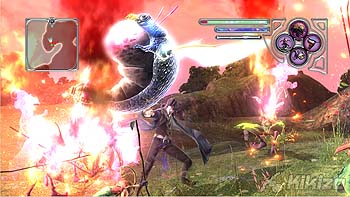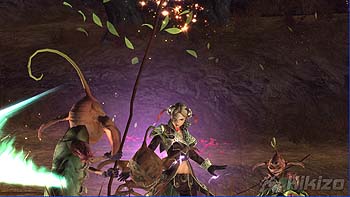Folklore: Yoshiki Okamoto Interview
We catch up with Okamoto to find out all about his new action-adventure steeped in Irish mythology.
Page: 1 2
Page 2
Basically, playing the game involves fighting and collecting Ids (spirits) from defeated enemies and using these in battles to help you defeat folks and collect other Ids. There's a kinetic element to the proceedings too, as Folklore makes extensive use of the Sixaxis controller.
To collect an Id you need to extract it from a folk and there are a handful of ways you can do this. There's the straightforward way, where you simply pull up on the controller, ripping out the soul (or multiple souls, in some cases) from your enemy.
But there are more advanced mechanics too, indicated onscreen, telling you, for instance, that you need to tilt the controller side to side, balancing a glowing soul on top of your enemy as you weaken it.
Ellen has no physical attacks, but Keats is able to fuse folks with his arm, creating a physical weapon he can use. It's all part of the supernatural elements associated with the Netherworld, where the folk live.
Using the folks is as simple as mapping them to face buttons from a gallery and then using them directly in combat. You're limited in the frequency you can use your ghostly arms, but for the least powerful ones you'll be able to use them almost non-stop.
Both Keats and Ellen will have various capabilities in the seven realms that comprise the Netherworld. Keats is able to assume a second form through a process Game Republic is calling transcension. Once you've earned enough energy to cross over, Keats takes on a darker, tattooed form that acts as a god mode, making him invincible for a while.
Ellen's powers, on the other hand, are directly related to her various costumes. There are seven of these and they're related to the realms in the game. There's a saucy black number for the Hell Realm, something more woodsy for another and so on. These are more than just eye-candy too, since they alter Ellen's parameters.
If any of the collecting parts of Folklore sound vaguely Pokémon-esque to you, you're not alone. But trading characters is something that's not going to happen. Okamoto said that while players will be able to create and share dungeons, allowing them to trade creatures over the internet would "destroy the balance" the team worked so hard to reach.
There's another facet of the game that may seem like something straight out of Nintendo's playbook: link-up.
As mentioned earlier this week, Sony confirmed during our visit that Folklore is also coming to the PSP, courtesy of Shin Megami Tensei creator Kouji Okada. That opens up the possibility of transferring folks from the PS3 version to the one on the PSP and vice versa. But is it going to happen? It seems likely but Sony made sure to avoid confirming or denying anything.
What needs no confirmation is that the PS3 game is, at least, looking like something quite different for the console's current audience. But don't take our word for it. There's a playable demo of the game up right now on the PlayStation Store.
Page: 1 2
Click here for Kikizo's interview archive.









 Satoru Iwata Video Interview - the late Nintendo president spoke with Kikizo in 2004 as 'Nintendo Revolution' loomed.
Satoru Iwata Video Interview - the late Nintendo president spoke with Kikizo in 2004 as 'Nintendo Revolution' loomed. Kaz Hirai Video Interview - the first of Kikizo's interviews with the man who went on to become global head of Sony.
Kaz Hirai Video Interview - the first of Kikizo's interviews with the man who went on to become global head of Sony. Ed Fries Video Interview - one of Xbox's founders discusses an epic journey from Excel to Xbox.
Ed Fries Video Interview - one of Xbox's founders discusses an epic journey from Excel to Xbox. Yu Suzuki, the Kikizo Interview - we spend time with one of gaming's most revered creators.
Yu Suzuki, the Kikizo Interview - we spend time with one of gaming's most revered creators. Tetris - The Making of an Icon: Alexey Pajitnov and Henk Rogers reveal the fascinating story behind Tetris
Tetris - The Making of an Icon: Alexey Pajitnov and Henk Rogers reveal the fascinating story behind Tetris Rare founders, Chris and Tim Stamper - their only interview? Genuinely 'rare' sit down with founders of the legendary studio.
Rare founders, Chris and Tim Stamper - their only interview? Genuinely 'rare' sit down with founders of the legendary studio. The History of First-Person Shooters - a retrospective, from Maze War to Modern Warfare
The History of First-Person Shooters - a retrospective, from Maze War to Modern Warfare